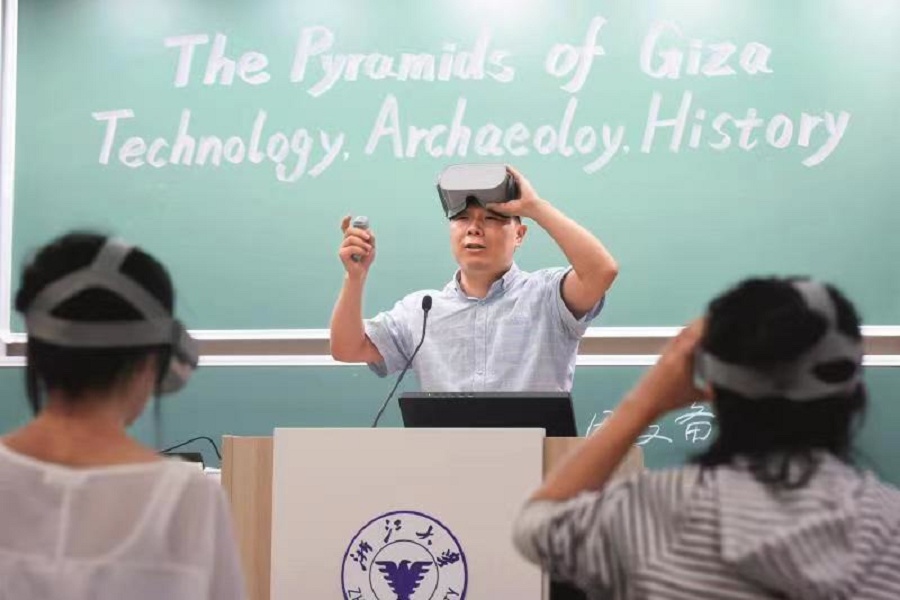Present Situation and Measures on Metaverse Development in China

A visitor interacts with a device at a metaverse-themed immersive digital art exhibition at the Beijing World Art Museum, September 9, 2022. (Photo by Chen Ye/China Pictorial)
Since the online gaming platform Roblox went public as the first metaverse stock in March 2021, investors and technology companies have poured money and effort to capture the emerging market. In July 2021, Facebook founder Mark Zuckerberg announced that the company would likely transition from a social media company to a metaverse company within five years. Metaverse gaming started a couple of years ago when the sandbox game Minecraft was available on Microsoft’s HoloLens virtual reality (VR) headset. In February 2020, Tencent invested in Roblox and became the company’s product publishing agent in China. At the end of 2020, Tencent proposed “Holographic Internet,” a concept describing the same technological vision as the metaverse. Another Chinese technology company, Baidu, also invested greatly in the research and development (R&D) of metaverse products by establishing artificial intelligence (AI)-driven augmented reality (AR) labs, VR labs, and VR interactive platforms.
With the meteoric rise in the popularity of the metaverse, technology companies and other players have showed great interest and become involved in the new industry. The metaverse’s origins and development status, as well as the potential impact, changes, and challenges it will bring to life, are all topics worthy of discussion alongside how to better develop it.
Problems
Originating in Neal Stephenson’s 1992 sci-fi novel Snow Crash, at first “metaverse” was just a technological concept. A new concept is often followed by market hype that drives the industry bubble, and when the bubble bursts, the market will cool down and enter steady development. Capital has been pouring into the metaverse industry, and the hype about the metaverse has become inflated. Some companies are trying to attract funds through hype or leverage the herd mentality to get the consumers to take the bait. Mature technical systems and sufficient application scenarios and product verifications are not yet in place to support the metaverse industry. Whether the metaverse is a bubble or development opportunity remains uncertain.
The metaverse represents an integration and innovation in humanities, economics, society, and culture in the virtual and real worlds. It is a highly realistic simulated space. No one can predict the future, but everyone can create the future. They can create their own digital content and digital assets to influence the future metaverse. In the virtual world, more users participate in the building of the metaverse. Different roles and activities constitute a new virtual society, posing unprecedented regulatory challenges. Governments and regulators need to deal with issues concerning major public interests and public safety in the virtual world. They also need to guard against unsafe situations in which users hiding behind virtual identities commit illegal or criminal acts or vent their dissatisfaction and negative feelings by retaliating in the metaverse.
The metaverse is an intelligently enhanced world supported by data and information, and data is one of the key factors driving the development of the metaverse. Thanks to multiple technologies, the highly sought-after metaverse provides an immersive, real-time interactive, and chronologically compatible virtual world that can enhance various experiences, enrich perceptions, and cultivate creativity. It is a supplement and extension of the real world in which we live. However, it’s also accompanied with the risk of privacy leakage after huge numbers of users store massive amounts of sensitive data such as identity attributes, social relationships, asset status, and emotional relationships. Data privacy and security in the metaverse have always required vigilance. Before the emergence of the metaverse, the latest generation of information technologies represented by AI and blockchain already struggled with private data disclosure in realms such as virtual currency theft, AI fraud, wearable devices and cloud data hacking, and sensitive information obtained through Ethereum.
The metaverse is a digital world that follows the general rules of the physical world while integrating technologies such as blockchain, VR, AR, AI, 5G, and big data. Its development will be highly dependent on high-performance hardware and efficient software. After Facebook renamed itself Meta and announced a new focus on the metaverse, Chinese companies including Tencent, Baidu, and ByteDance all followed and joined the race to win the metaverse market. However, preliminary construction requires massive amounts of technology and capital, and product R&D involves long-term verification and trial-and-error process. The high threshold and big investment required to operate the metaverse has dampened enthusiasm from small and medium-sized enterprises (SMEs).
Countermeasures
Metaverse companies should be encouraged to explore the industry under the principles of technological development, risks prevention and control, and speculation reduction. Development of the metaverse should be coordinated with industrial policies, employment opportunities, and regulations to prevent the collapse of real-world industries due to excessive indulgence into the virtual.
Industrial policies should be introduced to support SMEs in metaverse development. Governments at all levels can learn from the policies and measures of leading metaverse countries and regions including the United States, Europe, Japan, and South Korea, and release supporting policies with local characteristics to serve the metaverse industry and the needs of enterprises and the market. They should build an empowering metaverse environment by focusing on key technological breakthroughs, rapid implementation of typical applications, content creation platform construction, and R&D solutions.
Metaverse players should curb the hype. The public should be educated to rationally understand and cautiously get involved in the metaverse to encourage healthy R&D and innovation, curb the hype, and prevent bubbles. Users should be warned about potential metaverse scams to avoid losses. Universal metaverse standards should be formulated to foster unified understanding and healthy and orderly development.
Supervision should be strengthened to avoid privacy leakage. Regulators should consider the big picture in economics, security, and privacy issues, summarize experience in network platform governance, and plan forwardly for platform monopolies, tax collection and management, regulation and review, data security, and social norms as well as refining and improving governance methods such as legislation, law enforcement, and supervision.

A teacher and students at Zhejiang University attend an archaeological lecture about the Egyptian pyramids with far-off students of Harvard University via head-mounted VR interactive devices on their campus in Hangzhou, Zhejiang Province, September 26, 2018. (Photo from VCG)
Trends
The COVID-19 pandemic has accelerated the digital transformation of the economy and society, heralding a comprehensive digital convergence with deepening innovation and reform in office, education, shopping, and medical care. The virtual world provides a new space for digital avatars to interact and network. The metaverse industry is in its infancy, and the discussion is now focused on concepts, technical systems, and business logic. The metaverse is expected to create a safer, more ideal, and more integrated immersive experience as its key technologies mature and are applied and verified in more scenarios.
The development of the metaverse drives information technologies, which also causes uncertainties. Built on the internet, the metaverse is a constantly colliding and expanding “universe” composed of countless virtual worlds and digital contents. In the initial stage, blockchain could help establish a reliable and credible digital interaction network, VR and AR enable users to get completely immersed in a simulated environment, and AI supports innovating and iterating in the metaverse. The numerous metaverse application scenarios, huge user base, and diverse user demands will accelerate improvement and integration of key technologies and drive the development of related information technologies. But the metaverse is built on information technologies driven by human imagination. To obtain a richer experience in the virtual world, users will create more digital avatars just like the non-playable characters (NPCs) in the 2021 movie Free Guy. Such avatars could possibly have similar intelligence and behavioral capabilities as humans thanks to technology self-learning, updating, and iteration. The paths the metaverse will eventually take remain unpredictable.
The metaverse can transform and upgrade society and reform the real economy and employment. It can be regarded as a digital world built on underlying technologies such as mixed reality and digital modeling. Blockchain-based decentralized value transfer will probably build new social networks and collaboration in the metaverse and reshape social forms in different dimensions like identity, economy, and governance. To ensure that the virtual world is not disconnected from the real one, it is necessary to improve and integrate information technologies during new infrastructure construction in the real world and make the metaverse a propeller for it. However, gradual implementation of the metaverse in social networking, business travel, art, education, and medical care will generate more immersive and real-time interactive applications such as cloud shopping, cloud classrooms, cloud meetings, and cloud tourisms, bringing changes to e-commerce and online education sectors and inevitably impacting employment in physical industries.
The author is chairman and founder of Sinodata Co., Ltd. This article is an excerpt from Annual Report on Metaverse Development in China (2022).